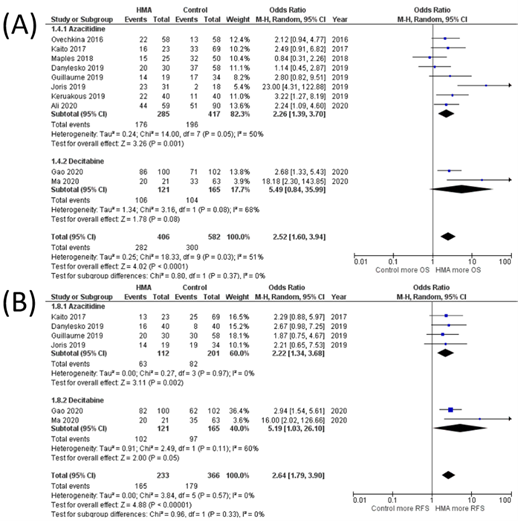Abstract

Background: After allogeneic hematopoietic stem cell transplantation (allo-SCT), 35%-45% of patients suffer disease relapse, resulting in dismal outcomes. Several strategies have been adopted to prolong disease-free intervals. Hypomethylating agents (HMA) seem to have a range of properties favorable to post-allo-SCT maintenance. They mediate a direct anti-leukemic effect in acute myeloid leukemia (AML) and myelodysplastic syndrome (MDS), regardless of their molecular mutation profile. Moreover, their abilities to induce a CD8+ tumor-specific T cell response, together with the expansion of regulatory T cells, leads to an epigenetically enhanced graft-versus-leukemia effect that is not counterbalanced by an increased risk of graft-versus-host disease (GVHD).
Materials and Methods: Two investigators independently searched the Embase and MEDLINE databases for relevant studies published from inception to 31 January 2021. The inclusion criteria were as follows: (1) the studies had to be either randomized controlled trials or cohort studies; (2) the patients underwent allo-SCT for AML or MDS; (3) the studies compared 2 patient groups: one receiving HMA maintenance post-allo-SCT, and the other being an observational group; and (4) the studies needed to report at least one of our primary outcomes of interest; overall survival (OS), relapse-free survival (RFS), grade II-IV acute GVHD, and chronic GVHD.
Results: Eleven eligible studies compared HMA maintenance to observation following allo-SCT for AML or MDS. The OS of the HMA maintenance group was superior to the observation group, with a pooled odds ratio (OR) of 2.52 (95% CI, 1.60-3.94; I 2, 51%; Figure 1A). Similarly, a pooled meta-analysis found that the RFS was significantly better for patients receiving HMA maintenance, with a pooled OR of 2.64 (95% CI, 1.79-3.90; I 2, 0%; Figure 1B). Moreover, the cumulative incidence of relapse (CIR) was significantly lower in patients who received HMAs. The HMA group also had lower non-relapse mortality (NRM) compared with the observation group. Overall, the incidences of grade II-IV acute GVHD and chronic GVHD did not differ in both groups. However, when looking specifically at those receiving decitabine maintenance, the rate of chronic GVHD seemed to be lower compared with observation alone.
Conclusions: The current systematic review and meta-analysis illustrated that AML and MDS patients receiving HMA maintenance after allo-SCT had better outcomes in regards to OS, RFS, NRM, CIR as well as a reduced incidence of chronic GVHD.
Figure 1. Forest plots of the meta-analysis of HMA maintenance compared with observation. (A) OS rate. (B) RFS rate.
No relevant conflicts of interest to declare.
Author notes
 This icon denotes a clinically relevant abstract
This icon denotes a clinically relevant abstract


